#i stand with the wga
Text
Does anyone have an update on where things are at with the writers strike? It's disappeared from my various feeds and algorithms.
45K notes
·
View notes
Text
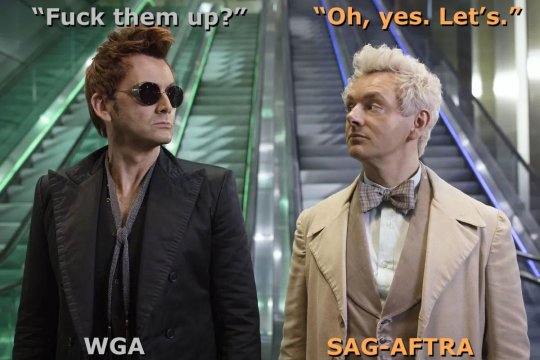
I made another thing.
With apologies to Neil Gaiman.
#tv writing#wga strong#wgawest#wga west#wga strike#support the wga#i stand with the wga#sag aftra#good omens#neil gaiman
54K notes
·
View notes
Text
#SAGAFTRAstrong #WGAstrong
30K notes
·
View notes
Text
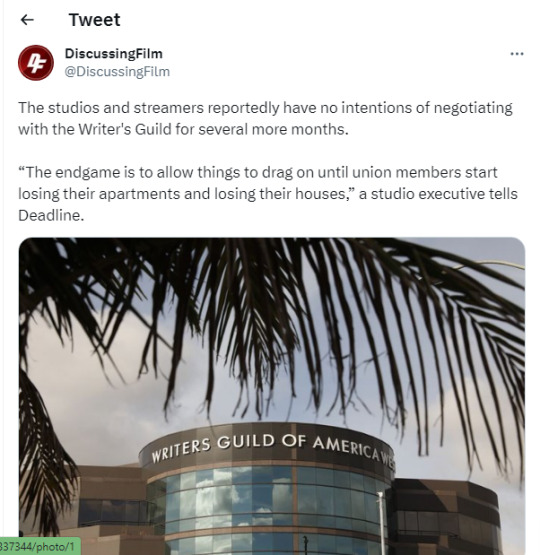
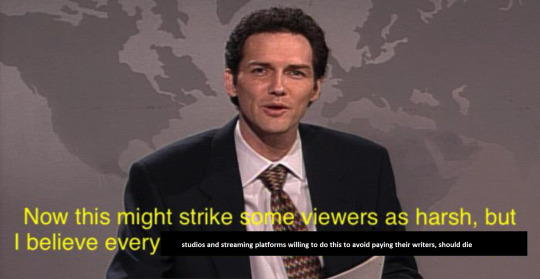
Imagine actually being so evil that you'd rather make sure your writers suffer financially instead of just paying them the pay they deserve.
Hell truly has some seats reserved already, holy shit.
#writers guild of america#wga#wga strike#i stand with the wga#would love to know what studio that dude works for#just for reasons you know#like we seriously need that actors strike now#truly screw over hollywood if they willing to do this
35K notes
·
View notes
Text
Keep seeing posts in solidarity with the WGA strike that say things like “no one cares about your favorite shows” and “fuck your tv show. I hope it gets canceled” and while I understand and agree with the underlying sentiment, which is clearly “Real people are more important than fictional ones, you dipshit” I don’t like the framing because, well, it feels shitty to dismiss the importance of the work made by the workers we’re trying to defend.
No one cares about your favorite shows more than the writers do.
No one understands the power and importance of tv and film more than the writers who created them.
No one loves tv, movies, games, and stories more than the people who fought tooth and nail in an incredibly competitive and underpaid profession for the chance to be part of it.
They know it’s important. They know it changes lives. They know it can be more than just a story, more than just a bit of entertainment. They’ve loved and respected this medium, continue to love and respect this medium, more than you ever will.
The person who wants a show to get canceled the least is the writer who poured their everything into making it good.
TV and movies are great, actually, and you are not wrong to be invested and care about them. That’s what the writers gave you. That’s what the writers wanted when they wrote it. That’s why they wrote it.
Which is why we respect them when they make the call that this strike and its demands are worth risking it.
The people on that picket line do not want their shows canceled. They want to keep writing them. They can’t, not under the current conditions.
So we accept the risk with them and support them.
But I don’t want to berate the power and importance of their work, the value they put into it and the love they have for it, in the same breath that I am defending their strike. Worthy shows will likely get canceled or derailed and that will be a tragedy worth mourning. The writers know that better than anyone.
So when they say something else is even more important, we listen. And when your favorite show gets ruined, you make sure your fully justified anger and grief is pointed in the right direction - at the CEOs who killed it.
27K notes
·
View notes
Text
“Wait, there are people blaming the writers?”
Are you surprised? Fandoms have become notorious anti-writer spaces. Studios love you guys. They can cut the budgets, cut the number of writers, cut the wages of the writers, and you guys always blame the writers. “The writers ruined the show!” It’s never “the studios ruined the show.”
I hate to break it to you: more than half the shows you complain were “ruined by the writers”, were ruined by the studios. Studios cut the scenes and arcs you were excited for. Studios cut the budget of the show, or even raise the budget of the show and force a “bigger, louder, bolder” tone on shows that were unexpected hits (this is where we get “the Netflix look” on every show post-Stranger Things and Queen’s Gambit).
You guys do not do your research. Half your fanfics are tagged with bad faith digs at the writers, when a few searches would reveal how strapped that show was and how poorly the writers were treated. Writers are being given a 10 weeks to write 10 episodes. How are good arcs and scenes supposed to happen under that time limit, with a max of only four writers?
Tumblr, the self-proclaimed “pro-union, pro-worker, pro-artist” site is also a major fandom site. You guys rarely practice good faith consumer etiquette for television and film writers, because your fandom salt always turns you against writers. And studios love you for it.
Yeah, individual writers do create bad writing from time to time. But so do painters, chefs, and musicians. Directors and actors sometimes refuse to film certain scenes or follow a show’s projected style and arc, and the writers always get the crap for a bad performance or a poorly directed episode. This isn’t to blame actors or directors; it’s to point out that you guys have one villain, and it’s always the writers. You guys never give writers the same grace you give animators, designers, directors, actors, composers, and editors.
Studios love you every time you say “the writers ruined the show.” Every single popular fandom is guilty of this. View any of the “why did the writers cut this scene, they hate my characters” talk when leaked scenes hit the internet. Writers barely get paid for what they do write. You think they’re writing scenes and then happily throwing them in the shredder? You guys just eat the talk that studios put out. Always have.
34K notes
·
View notes
Text

#has this been done already lol#wga#writer’s guild of america#sag aftra#wga strike#i stand with the wga
15K notes
·
View notes
Text
26 September: thread by WGA member David Slack
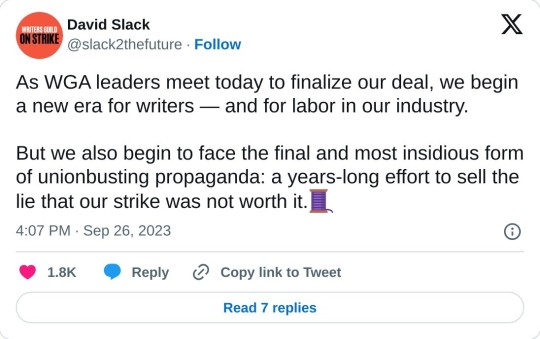
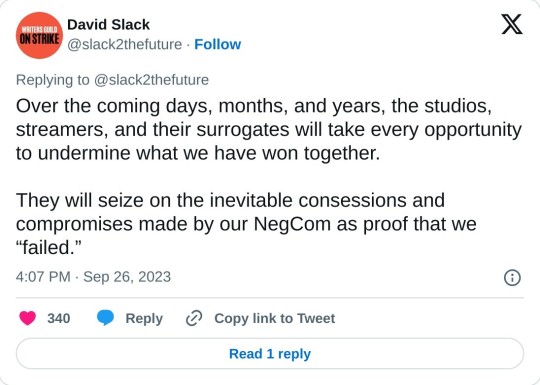
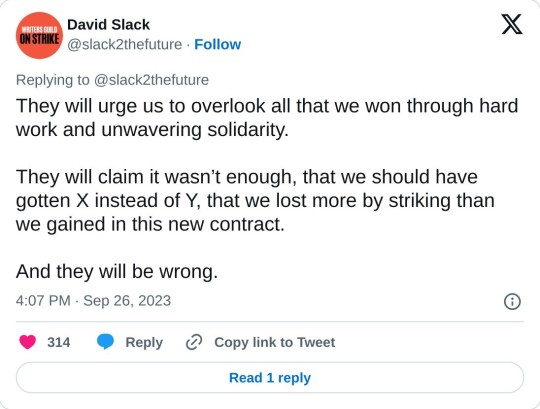
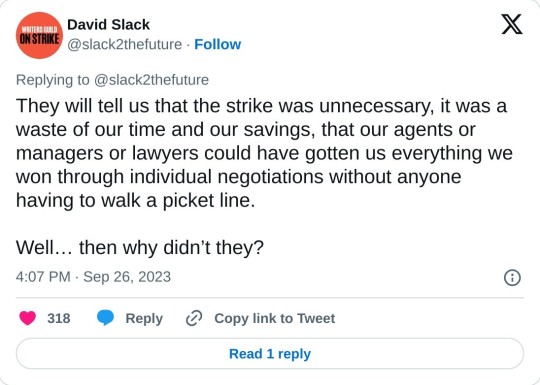
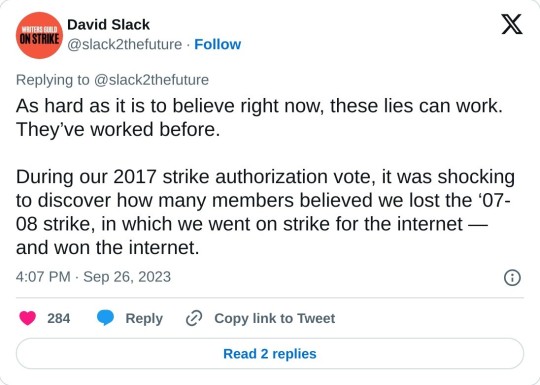
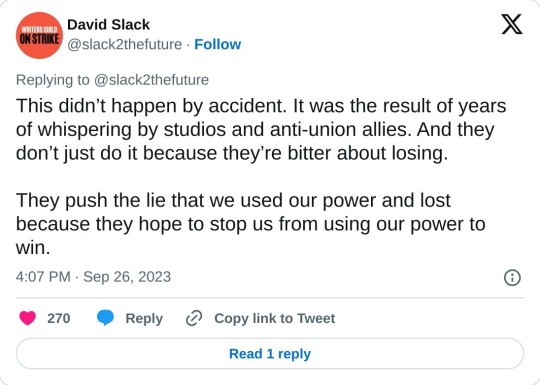
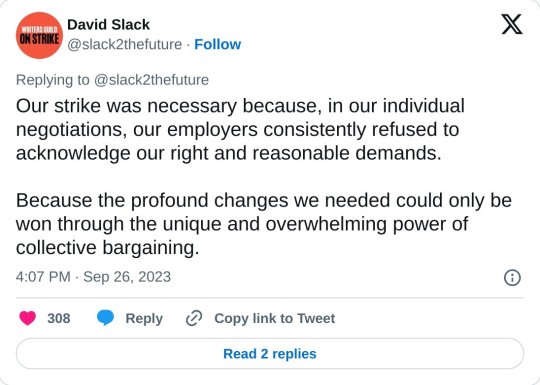
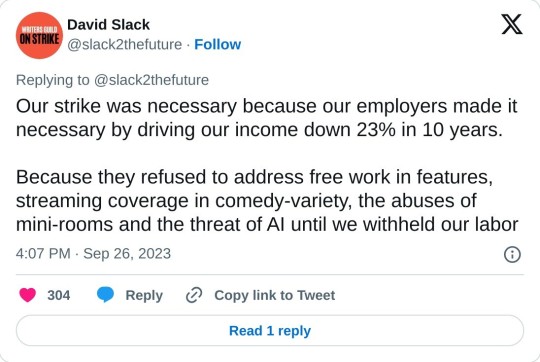
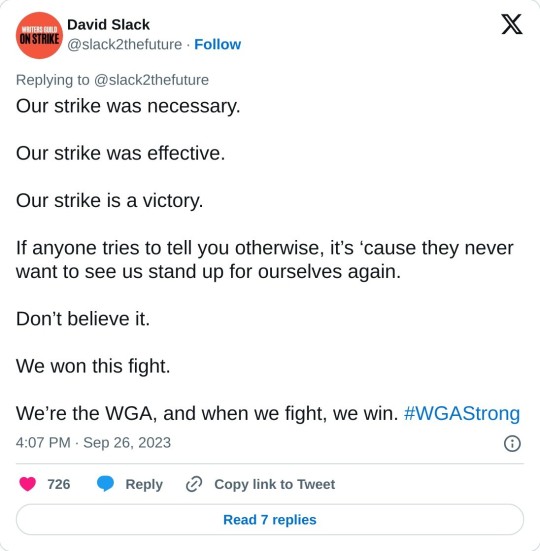
Twitter thread by David Slack @/slack2thefuture:
"As WGA leaders meet today to finalize our deal, we begin a new era for writers — and for labor in our industry. But we also begin to face the final and most insidious form of unionbusting propaganda: a years-long effort to sell the lie that our strike was not worth it.
Over the coming days, months, and years, the studios, streamers, and their surrogates will take every opportunity to undermine what we have won together. They will seize on the inevitable consessions and compromises made by our NegCom as proof that we “failed.”
They will urge us to overlook all that we won through hard work and unwavering solidarity. They will claim it wasn’t enough, that we should have gotten X instead of Y, that we lost more by striking than we gained in this new contract. And they will be wrong.
They will tell us that the strike was unnecessary, it was a waste of our time and our savings, that our agents or managers or lawyers could have gotten us everything we won through individual negotiations without anyone having to walk a picket line. Well… then why didn’t they?
As hard as it is to believe right now, these lies can work. They’ve worked before. During our 2017 strike authorization vote, it was shocking to discover how many members believed we lost the ‘07-08 strike, in which we went on strike for the internet — and won the internet.
This didn’t happen by accident. It was the result of years of whispering by studios and anti-union allies. And they don’t just do it because they’re bitter about losing. They push the lie that we used our power and lost because they hope to stop us from using our power to win.
Our strike was necessary because, in our individual negotiations, our employers consistently refused to acknowledge our right and reasonable demands. Because the profound changes we needed could only be won through the unique and overwhelming power of collective bargaining.
Our strike was necessary because our employers made it necessary by driving our income down 23% in 10 years. Because they refused to address free work in features, streaming coverage in comedy-variety, the abuses of mini-rooms and the threat of AI until we withheld our labor
Our strike was necessary. Our strike was effective. Our strike is a victory. If anyone tries to tell you otherwise, it’s ‘cause they never want to see us stand up for ourselves again. Don’t believe it. We won this fight. We’re the WGA, and when we fight, we win. #WGAStrong"
#wga strike#writers strike#union solidarity#i stand with the wga#sag-aftra strike#actors strike#wga strong#current events#david slack#long post#fans4wga
10K notes
·
View notes
Text
You know what makes me the most upset about the use of AI in our culture? It's not just removing artists from art or devaluing human creativity -- it's treating people like they're disposable.
Oh, you're not that special. We have computers to do that now. If you died tomorrow, we have your image. We have your voice. We have your biometric data. We can just duplicate you, it's no problem. Who needs flesh and blood? Who needs agency and free thought? Who needs the human soul? You're just a tool. And when we're done with you, we'll just toss you aside and find someone else.
Creatives, listen to me, and listen to me good: you have a voice and it matters. There is no one in the history of the world who is exactly like you, in this time or this place. There is no one who thinks like you, acts like you, speaks like you, moves like you. There is nobody else built like you. Nobody else with your unique experiences and outlook of the world. You are a product of history, of culture, of art, of love, of pain, of possibility. Don't let them take that from you.
#WGA strike#sag aftra#AI#capitalism#human creativity#human rights#motivation#SAG-AFTRA strike#writers#artists#storytellers#fanfiction#mental health#self-love#self-affirmation#Hollywood#i stand with the wga
8K notes
·
View notes
Text
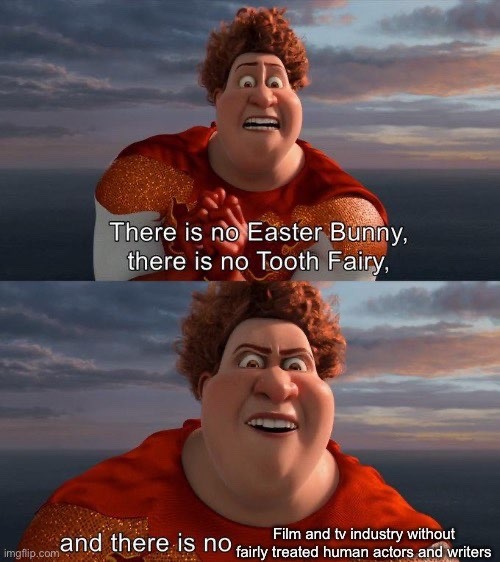
Stand with the entertainment unions to the end
#i stand with the wga#sag aftra#writers strike#writers guild strike#sag aftra strike#writers guild of america#screen actors guild
9K notes
·
View notes
Text
The way he SLAYYEDD
Ai could never give us “we put the greed in ingredients”
#netflix#wga strike#wga#writers guild strike#writers guild of america#wga solidarity#i stand with the wga#support the wga
7K notes
·
View notes
Text
"The Writers Guild has reached a tentative agreement with the Alliance of Motion Picture and Television Producers to end its strike after nearly five months. The parties finalized the framework of the deal Sunday when they were able to untangle their stalemate over AI and writing room staffing levels.
“We have reached a tentative agreement on a new 2023 MBA, which is to say an agreement in principle on all deal points, subject to drafting final contract language,” the guild told members this evening in a release, which came just after sunset and the start of the Yom Kippur holiday that many had seen deadline to wrap up deal after five days of long negotiations...
Despite today’s welcome news, it still will take a few days for the strike to be officially over as the WGA West and WGA East proceed with their ratification process. During the WGA’s last strike in 2007-08, a tentative agreement was reached on the 96th day and it wasn’t over until the 100th...
All attention will now turn to ratifying the WGA deal and getting SAG-AFTRA and the AMPTP back to the bargaining table to work out a deal to end the actors’ strike, which has now been going on for 70 days.
Details of the WGA’s tentative agreement haven’t been released yet but will be revealed by the guild in advance of the membership ratification votes. Pay raises and streaming residuals have been key issues for the guild, along with AI and writers room staffing levels."
-via Deadline, September 24, 2023
#HELL YEAH#wga#wga strike#wga strong#sag aftra strike#i stand with the wga#writers strike#sag strike#united states#unions#labor unions#union strong#workers rights#labor rights#strike#pro union#organized labor#STRIKES WORK AND UNIONS WORK#good news#hope#film#film industry#film and tv#entertainment industry#writers#hot labor summer#hot strike summer
4K notes
·
View notes
Text
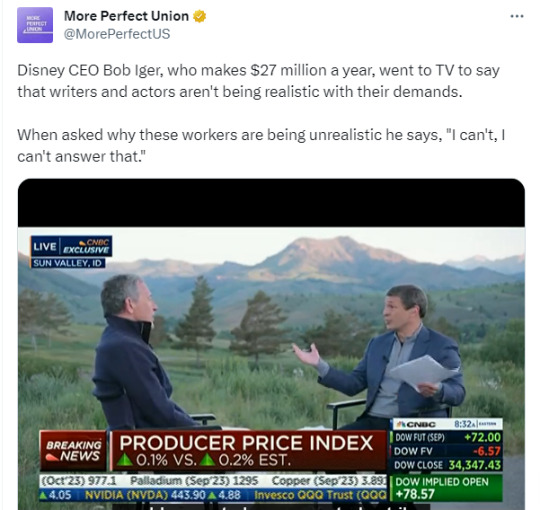
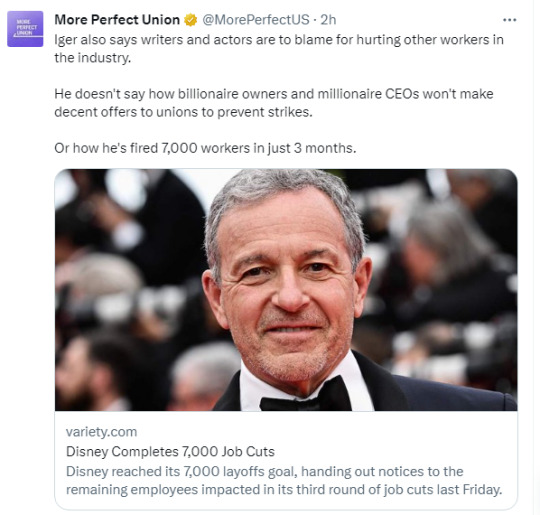
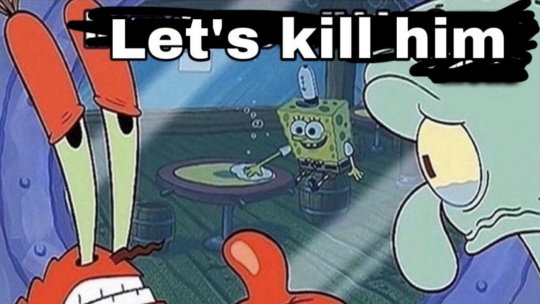
Bob Iger saying all this while also being on basically billionaires vacation really should say something, holy shit.
#writers guild of america#screen actors guild american federation of television and radio artists#wga#sag aftra#wga strike#sag aftra strike#i stand with the wga#i stand with the sag aftra#disney wouldn't even be alive nowadays if it won't for the creatives behind it#and yet bob wants to keep refusing to pay them what they deserve#while also giving himself a nice bonus with his contract being extended#same energy as in the UK the MPs wanting double their pay while everyone else suffers
4K notes
·
View notes
Text

say it with me “FUCK AI”

3K notes
·
View notes
Text
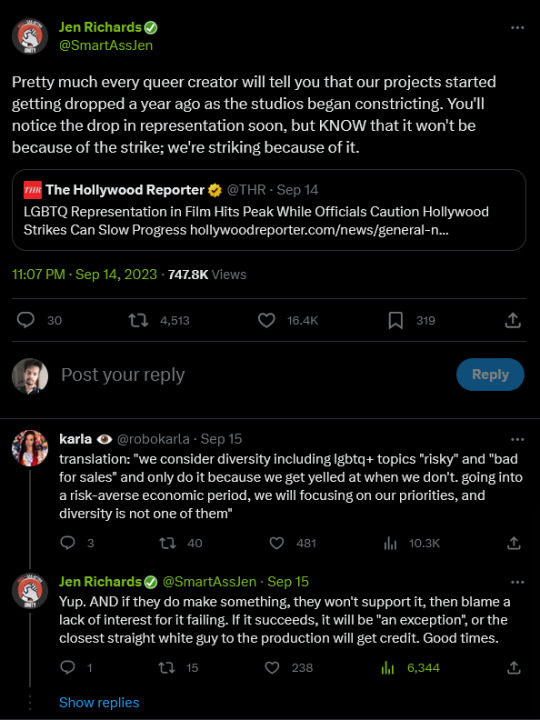
#wga strong#lgbtq#lgbtqia#lgbtq community#nonbinary#sapphic#nonbinary lesbian#lesbian#gay girls#lgbt pride#queer#support the wga#wga solidarity#wga strike#i stand with the wga#sag aftra strike#actors strike#writers strike#sag strike#sag aftra#sag strong#writers guild of america#amptp
2K notes
·
View notes
Text
"The studios thought they could handle a strike. They might end up sparking a revolution"
by Mary McNamara
"If you want to start a revolution, tell your workers you’d rather see them lose their homes than offer them fair wages. Then lecture them about how their “unrealistic” demands are “disruptive” to the industry, not to mention disturbing your revels at Versailles, er, Sun Valley.
Honestly, watching the studios turn one strike into two makes you wonder whether any of their executives have ever seen a movie or watched a television show. Scenes of rich overlords sipping Champagne and acting irritated while the crowd howls for bread rarely end well for the Champagne sippers.
This spring, it sometimes seemed like the Hollywood studios represented by the Alliance of Motion Picture and Television Producers were actively itching for a writers’ strike. Speculations about why, exactly, ran the gamut: Perhaps it would save a little money in the short run and show the Writers Guild of America (perceived as cocky after its recent ability to force agents out of the packaging business) who’s boss.
More obviously, it might secure the least costly compromise on issues like residuals payments and transparency about viewership.
But the 20,000 members of the WGA are not the only people who, having had their lives and livelihoods upended by the streaming model, want fair pay and assurances about the use of artificial intelligence, among other sticking points. The 160,000 members of the Screen Actors Guild-American Federation of Television and Radio Artists share many of the writers’ concerns. And recent unforced errors by studio executives, named and anonymous, have suddenly transformed a fight the studios were spoiling for into a public relations war they cannot win.
Even as SAG-AFTRA representatives were seeing a majority of their demands rejected despite a nearly unanimous strike vote, a Deadline story quoted unnamed executives detailing a strategy to bleed striking writers until they come crawling back.
Days later, when an actors’ strike seemed imminent, Disney Chief Executive Bob Iger took time away from the Sun Valley Conference in Idaho not to offer compromise but to lecture. He told CNBC’s David Faber that the unions’ refusal to help out the studios by taking a lesser deal is “very disturbing to me.”
“There’s a level of expectation that they have that is just not realistic,” Iger said. “And they are adding to the set of the challenges that this business is already facing that is, quite frankly, very disruptive.”
If Iger thought his attempt to exec-splain the situation would make actors think twice about walking out, he was very much mistaken. Instead, he handed SAG-AFTRA President Fran Drescher the perfect opportunity for the kind of speech usually shouted atop the barricades.
“We are the victims here,” she said Thursday, marking the start of the actors’ strike. “We are being victimized by a very greedy entity. I am shocked by the way the people that we have been in business with are treating us. I cannot believe it, quite frankly: How far apart we are on so many things. How they plead poverty, that they’re losing money left and right, when giving hundreds of millions of dollars to their CEOs. It is disgusting. Shame on them. They stand on the wrong side of history at this very moment.”
Cue the cascading strings of “Les Mis,” bolstered by images of the most famous people on the planet walking out in solidarity: the cast of “Oppenheimer” leaving the film’s London premiere; the writers and cast of “The X-Files” reuniting on the picket line.
A few days later, Barry Diller, chairman and senior executive of IAC and Expedia Group and a former Hollywood studio chief, suggested that studio executives and top-earning actors take a 25% pay cut to bring a quick end to the strikes and help prevent “the collapse of the entire industry.”
When Diller is telling executives to take a pay cut to avoid destroying their industry, it is no longer a strike, or even two strikes. It is a last-ditch attempt to prevent le déluge.
Yes, during the 2007-08 writers’ strike, picketers yelled noncomplimentary things at executives as they entered their respective lots. (“What you earnin’, Chernin?” was popular at Fox, where Peter Chernin was chairman and chief executive.) But that was before social media made everything more immediate, incendiary and personal. (Even if they have never seen a movie or TV show, one would think that people heading up media companies would understand how media actually work.)
Even at the most heated moments of the last writers’ strike, executives like Chernin and Iger were seen as people who could be reasoned with — in part because most of the executives were running studios, not conglomerations, but mostly because the pay gap between executives and workers, in Hollywood and across the country, had not yet widened to the reprehensible chasm it has since.
Now, the massive eight- and nine-figure salaries of studio heads alongside photos of pitiably small residual checks are paraded across legacy and social media like historical illustrations of monarchs growing fat as their people starve. Proof that, no matter how loudly the studios claim otherwise, there is plenty of money to go around.
Topping that list is Warner Bros. Discovery Chief Executive Davd Zaslav. Having re-named HBO Max just Max and made cuts to the beloved Turner Classic Movies, among other unpopular moves, Zaslav has become a symbol of the cold-hearted, highly compensated executive that the writers and actors are railing against.
The ferocious criticism of individual executives’ salaries has placed Hollywood’s labor conflict at the center of the conversation about growing wealth disparities in the U.S., which stokes, if not causes, much of this country’s political divisions. It also strengthens the solidarity among the WGA and SAG-AFTRA and with other groups, from hotel workers to UPS employees, in the midst of disputes during what’s been called a “hot labor summer.”
Unfortunately, the heightened antagonism between studio executives and union members also appears to leave little room for the kind of one-on-one negotiation that helped end the 2007-08 writers’ strike. Iger’s provocative statement, and the backlash it provoked, would seem to eliminate him as a potential elder statesman who could work with both sides to help broker a deal.
Absent Diller and his “cut your damn salaries” plan, there are few Hollywood figures with the kind of experience, reputation and relationships to fill the vacuum.
At this point, the only real solution has been offered by actor Mark Ruffalo, who recently suggested that workers seize the means of production by getting back into the indie business, which is difficult to imagine and not much help for those working in television.
It’s the AMPTP that needs to heed Iger’s admonishment. At a time when the entertainment industry is going through so much disruption, two strikes is the last thing anyone needs, especially when the solution is so simple. If the studios don’t want a full-blown revolution on their hands, they’d be smart to give members of the WGA and SAG-AFTRA contracts they can live with."
#sag-aftra strike#sag strike#fans4wga#writers guild strike#actors guild strike#union solidarity#wga strong#i stand with the wga#wga strike#writers strike
7K notes
·
View notes